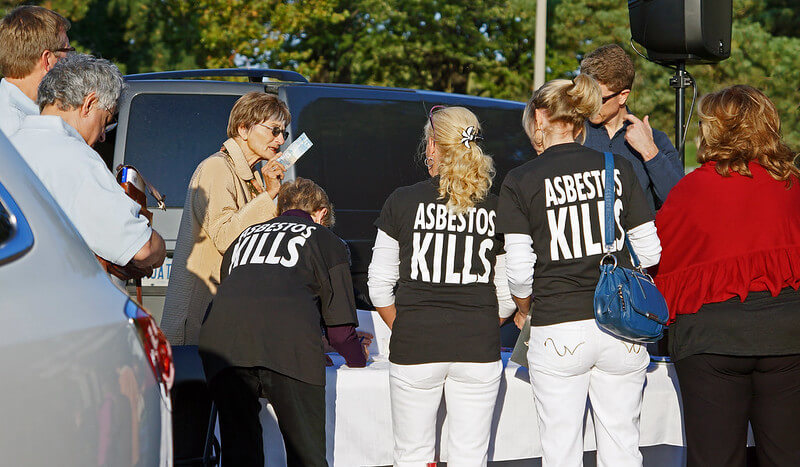Labor Unions and Asbestos Exposure
Unions have been the backbone for many employees when it comes to raising awareness of dangerous workplace environments, including exposure to asbestos.

How Labor Unions Protect Against Asbestos
Labor unions have played a vital role in helping protect employees from toxic asbestos, pushing for safer working conditions, more robust legislation and fairer treatment for those harmed by the product.
They are considered leaders in the fight against asbestos.
Although labor unions’ history traces back to the earliest days of the 20th century, their battle against asbestos exposure—and the devastation it causes—didn’t take off until the end of World War II in 1945.
The post-war era brought tremendous prosperity to American business. Still, it also bolstered the strength of unions. It uncovered the frightening truth that workers exposed to asbestos were dying in disproportionate numbers, and manufacturers of the products were doing their best to hide that fact.
Unions helped bring it to light.
History of Asbestos Use in U.S. Industries
Asbestos is a naturally occurring mineral that became valuable throughout the 20th century. It became famous for its ability to fireproof and strengthen almost anything mixed with it. The versatility and affordability of asbestos made it synonymous with the post-war economic boom in North America.
Despite its usefulness, asbestos was toxic to those around it, leading to many serious health issues, including respiratory diseases, asbestosis and mesothelioma — a rare, aggressive cancer with no known cure.
Because asbestos became so pervasive after World War II, it left its imprint on various industries, including construction, manufacturing, mining, shipbuilding, railroading and automobile production.
It was present in thousands of products, including cement, insulation, roofing materials, clutches, gaskets and brakes, caulking compounds and plasters, fire-retardant coatings and paints.
Labor unions began seeing firsthand what it was doing to their members. Inhaling or ingesting toxic asbestos fibers was leading to serious health issues in many trades.

Union Involvement Starts to Grow
Dozens of trade unions popped up in the 20th century. Some of the more influential ones still exist, such as:
- International Association of Heat and Frost Insulators and Allied Workers: The union represents a number of different construction trades. It includes those skilled in the installation of mechanical insulation, asbestos and lead mitigation, and specialty fabrications.
- International Brotherhood of Boilermakers: This is a diverse union that goes beyond boiler construction and repair. Its workers are in industrial construction, maintenance and repair, manufacturing, marine repair and shipbuilding, mining and quarrying.
- United Auto Workers (UAW): The UAW goes well beyond the automobile industry while representing members in almost every sector of the economy. It includes auto manufacturing, high-tech aerospace and defense, health care, higher education and the gaming industry.
- Utility Workers Union of America: These are workers in the gas, water, electric and nuclear industries.
- United Union of Roofers, Waterproofers & Allied Workers: The union represents those who work with roofing and waterproofing systems, including low-sloped and steep-sloped roofing and air-barrier applications.
- Brotherhood of Locomotive Engineers and Trainmen: This is North America’s oldest rail labor union, which celebrated its 150th anniversary in 2013. It represents most all train-service employees on numerous railroads.
- International Longshoremen’s Association, AFL-CIO: It’s the largest collection of maritime workers in North America.
- [United Mine Workers of America, AFL-CIO: A diverse group of coal miners, manufacturing workers, public employees, truck drivers and clean coal technicians forms this union that was founded in 1890.
- International Association of Bridge, Structural, Ornamental and Reinforcing Iron Workers Union: These are the people who erect the skeletons of almost every major structure, including schools, stadiums, bridges, shopping malls, hospitals and office parks.
Union involvement in the fight to protect workers has varied through the years, often depending on what trade or industry was affected.
Voices of Unions Are Active and Heard
Unions are best known for bargaining to improve wages, benefits and working conditions. Still, they have also been equally instrumental in protecting workers from unsafe conditions and toxic materials like asbestos.
Unions were warning employees and companies about the dangers of asbestos nearly 70 years ago, but unfortunately, their voices often weren’t loud enough or powerful enough. Businesses put profits ahead of worker safety, and workers were continually exposed to the toxic mineral, resulting in future serious illnesses.
Companies that manufactured asbestos products knew of the toxicity, but they suppressed the medical and scientific evidence, knowing many asbestos diseases take decades to develop.
Unions were sounding the alarm, even in the early years, long before politicians started legislating compliance with stricter asbestos controls.
The United Steelworkers Union, for example, has lobbied Congress for decades in hopes of amending the current Toxic Substances Control Act to protect its workers better.
The union presented its latest case in 2013 to a House of Representatives Subcommittee, citing the Environmental Protection Agency’s (EPA) ineffectiveness and the laws that have prevented the complete ban on asbestos in manufacturing. The EPA had passed a ban in 1989, but a federal court overturned it in 1991.
“As a result, asbestos is still in commercial use in the United States. The EPA has not tried to ban a substance since the ruling on asbestos 22 years ago,” cited the official report submitted to Congress in 2013.
Unions have been instrumental in the legislative process for many years. Since 2005, for example, different versions of proposed legislation in Congress have tried to weaken the ability of asbestos victims to hold companies legally accountable for their asbestos negligence. The unions have helped fight off those bills.
On the state level, labor unions in Wisconsin, West Virginia and Ohio are battling business-backed legislative efforts today to weaken their influence and put undo restrictions on asbestos victims seeking compensation for their suffering.

Get help paying for mesothelioma treatment by accessing trust funds, grants and other options.
Get Help NowHeat and Frost Insulators Union
For decades, the International Association of Heat and Frost Insulators & Allied Workers has led several initiatives that have helped its workers with the asbestos issue.
A Health Hazard Screening Program helped workers and their families. A Political Action Fund ensured the union’s voice had a place in Congress. An Instructor Training Program for Asbestos Removal delivered additional resources for union members to help educate themselves.
The theme continually reinforced on the union website is that “it is the workers’ right to know when they are in danger.”
That same union was publishing books and brochures on asbestos for its members. Titles included ” Danger—Asbestos Kills, A Worker’s Guide to Health Rights,” “Don’t Let Asbestos Kill Your Wife and Children,” and “Here’s How to Protect Yourself.”
Additional Union Involvement
Unions have long encouraged members to get politically and legislatively involved in their local communities, identifying causes and candidates supporting their views.
They spend considerable time, effort and money lobbying legislators at the national and state levels, keeping watch and protecting the advancements they have made.
Building trade unions are primarily responsible for the living wages that became standard in construction and trade industries. They also raise awareness about important issues affecting those who work around asbestos products. For example, data from New York City showed that minority workers performed 76% of asbestos removal work in 2020, and unions try to ensure this kind of work is distributed fairly.
In recent years, unions have worked closely with personal injury attorneys specializing in asbestos litigation, which is incredibly complex, to help their members find the help they need.
They have assisted in finding medical help and mesothelioma lawyers for members wronged by the big businesses where they worked. Unions have led the fight for early and routine health screenings for asbestos workers.
Even non-trade unions have helped the cause. The Capitol Police Union filed a formal complaint with its Office of Compliance in Washington, D.C., for failing to protect its officers from asbestos exposure.
The Firefighters Union in Everett, Washington, for example, worked to get lifetime medical monitoring for potential asbestos-related health problems for its members after they were exposed during a training session in old city-owned houses. Because of the union’s involvement, the city also agreed to pay for medical costs if future health problems arise. The city was responsible for a training session conducted without proper safety equipment.
Recommended Reading


